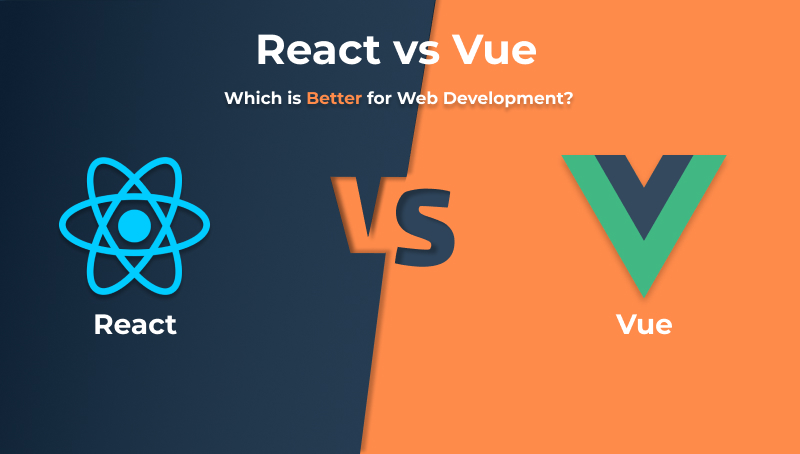In the world of web development, React and Vue stand as two powerful frameworks, each with their own unique strengths. Known for their impressive performance and developer-friendly experiences and offer a rich resource ecosystem. Discover the differences between them to confidently choose the right one for your project. Let’s dive in!
The purpose of this article is to present a thorough comparison of Vue.js and React.js, covering various aspects including general information and technical features. Although both of these web development technologies are well-known, have thriving communities, and receive a lot of support from developers, it’s crucial to understand that Vue.js is a framework and React is a library. So, why do we make a comparison when they are as different as chalk and cheese?
What is React?
React is a robust JavaScript framework and library designed for User Interface development. It has evolved over time and now offers a comprehensive ecosystem that enables it to handle intricate UI processes, data processing, personalization, and more. While React can function independently, it also integrates seamlessly with other libraries such as GraphQL and Redux.
Moreover, React.js extends its capabilities beyond web development and provides React Native, a powerful solution for building hybrid mobile applications. Hiring React developers can be an asset in your front-end development journey.
The following are a few major benefits of adopting React.js in your upcoming web app development project:
- Simplicity: React offers a straightforward and component-based approach, making it easy to learn and work with. Its JSX syntax allows for the combination of JavaScript and HTML.
- Dynamic Web App Development: React’s JSX supports HTML quotes and syntax, enabling the rendering of subcomponents. It efficiently handles HTML strings and facilitates the creation of dynamic web apps.
- Reusable Components: React’s component-based structure allows for the development of reusable HTML code snippets. This modularity enables flexibility and easy maintenance, even for complex applications.
- Optimized Performance: React leverages a virtual DOM, which improves performance by efficiently updating code in memory. This results in highly performant web apps.
- Thriving Community: React’s open-source nature has fostered a large and active global community of over 14.7 million developers. This community continually enhances React and provides support to fellow developers.
- SEO-friendly: React, especially when combined with tools like Next.js, dispels the notion that JavaScript frameworks are not SEO-friendly. React can render on the server side, allowing for search engine optimization and improved website indexing.
Several well-known web applications have been developed using React. These include social media giants like Facebook, Twitter, and Instagram, as well as popular platforms like Netflix, PayPal, and Dropbox. Additionally, reputable news outlets such as BBC News have embraced React for their web interfaces.
Even prominent communication tools like WhatsApp and internet pioneers like Yahoo have harnessed the power of React to deliver their services to users around the world.
What is Vue?
The Vue.js framework is specifically designed for UI design and development, with its core functionality centered around interface-related tasks. It can be seamlessly integrated into any JavaScript project for UI development while utilizing another JavaScript framework for more complex front-end operations. Vue’s primary focus is on handling the view of the software. Vue offers a similar feature called Vue Native, but it is not as widely adopted or feature-rich as React’s mobile development solution.
In contrast to React, Vue offers greater flexibility and versatility in terms of working with animations and state management. Vue provides an official library called Vuex for managing states, allowing for a more comprehensive set of features. On the other hand, to achieve a similar level of functionality depth in React, one would need to install numerous additional libraries.
Use Vue.js for your front-end project to reap the rewards from the following major benefits:
- Simplicity: Vue.js employs a single-file component-based architecture, allowing for easy testing, code understanding, optimization, and error identification.
- Lightweight: Vue.js has a small file size of around 20 kb, making it quick to download, install, and requiring minimal space.
- Supportive Tooling: Vue.js comes with a comprehensive set of tools, including Vue CLI, which enables rapid project scaffolding.
- Seamless Integration: Vue.js can easily integrate with other frameworks like Angular and React, making it adaptable to different project requirements and allowing for customized app UI.
Several widely used web applications have been developed using Vue. These include Gitlab, Adobe Portfolio, 9gag as well as Grammarly. Additionally, Vue is utilized by Nintendo, a renowned gaming company, and Font Awesome, a widely-used icon library.
React vs Vue: The Clash of the Front-End Titans
Let’s preview a tabular comparison of both for better understanding:
| Parameter | React | Vue |
| Type | Library | Framework |
| Language | JavaScript | JavaScript |
| Performance | High performance | High performance |
| Data Binding | One-way | Two-way |
| Learning Curve | Medium | Easy |
| Flexibility | High (but mostly via third-party add-ons) | High (mostly native with extensions) |
| Development | Many add-ons from third parties are simple to use. | With many native modules and fewer third-party add-ons, it is simple to get started. |
| Tools | Third-party CLI tool named create-react-app that aids programmers in completing tasks such as app building, scripting, and so on | Vue CLI offers numerous benefits, such as the flexibility to incorporate plugins at any stage of the project and straightforward customization options. |
| Scalability | More Scalable | Less Scalable |
| State Management | State data is immutable and requires the use of setState() or usestate() to update it | The data attribute collects application data directly without the need for a method like setState() to modify the state |
| Testing and Debugging | React.js offers various beneficial test runners like Jest and Mocha, which streamline the development process, facilitate uncovering flaws, enhance time-to-market, accelerate deployment, and foster a productive environment. | Vue’s testing capabilities are straightforward and effective, with recommended libraries like Vue Testing Library and Vue Test Utils ensuring code testability without compromising functionality, while CI/CD and hot reloading support enable faster feedback mechanisms. |
| Security | React security relies on the programmer’s skills and adherence to security standards. | Protecting Vue applications is comparatively simpler as Vue developers can sanitize HTML code or employ supplementary libraries for preventive measures. |
| Documentation and Community Support | Extensive documentation and a sizable, vibrant community. | The community is small yet active, and the documentation is strong. |
React vs Vue: Which Titan Wins the Battle?
JavaScript frameworks do not offer a universal solution, and both React and Next.js provide valuable options for developers. When deciding between Vue.js and React.js, it is essential to carefully consider the specific needs and priorities of your web application. So, how do you know which Titan you’ll place your bet on for your next project?
When to use React for development?
If you are contemplating the development of a community-based platform such as
- A marketplace or forum
- Social media applications like social networks or dating sites
- Or complex platforms that require robust web and mobile functionality
It is worth noting that React.js offers a comprehensive ecosystem and a versatile native development framework called React Native.
When to use Vue for development?
- Small web applications that prioritize speed and lightweight design.
- Real-time platforms, SaaS (Software as a Service), and peer-to-peer communities require efficient handling of multiple users and real-time operations.
- Content delivery platforms such as news apps, content creation apps, magazines, and blogs.
Vue’s fast performance, low-latency capabilities, and availability of essential and additional functionality make it a reliable choice for these types of applications.
Final Verdict
Vue and React are comparable tools that empower developers to build dynamic and fast-loading user interfaces. Vue tends to be simpler, making it more beginner-friendly, while React has a higher learning curve but is known for its flexibility. Despite the learning curve, React is widely recognized as an excellent tool with greater versatility compared to Vue.
In the battle of React vs. Vue, both frameworks have showcased their strengths and capabilities in the realm of web development. React impresses with its flexibility, extensive ecosystem, and ability to handle complex applications. On the other hand, Vue offers simplicity, ease of learning, and efficient performance.
In the end, the decision between React and Vue should be made based on the unique requirements and specifications of your project. Consider the nature of your application, its complexity, the desired performance, and the familiarity and expertise of your development team. By aligning your decision with the specific requirements of your project, you can ensure the success of your development journey.







